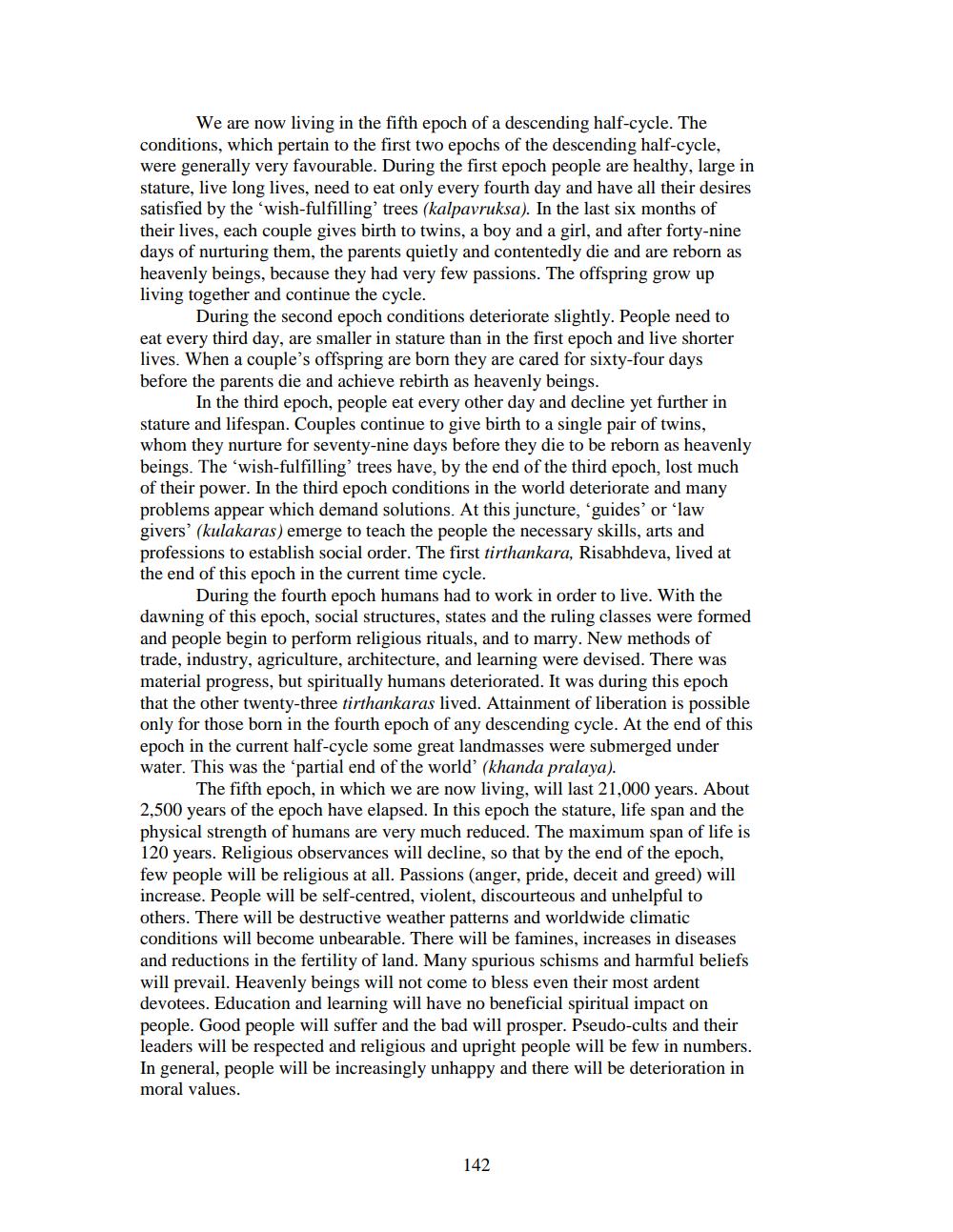________________
We are now living in the fifth epoch of a descending half-cycle. The conditions, which pertain to the first two epochs of the descending half-cycle, were generally very favourable. During the first epoch people are healthy, large in stature, live long lives, need to eat only every fourth day and have all their desires satisfied by the 'wish-fulfilling trees (kalpavruksa). In the last six months of their lives, each couple gives birth to twins, a boy and a girl, and after forty-nine days of nurturing them, the parents quietly and contentedly die and are reborn as heavenly beings, because they had very few passions. The offspring grow up living together and continue the cycle.
During the second epoch conditions deteriorate slightly. People need to eat every third day, are smaller in stature than in the first epoch and live shorter lives. When a couple's offspring are born they are cared for sixty-four days before the parents die and achieve rebirth as heavenly beings.
In the third epoch, people eat every other day and decline yet further in stature and lifespan. Couples continue to give birth to a single pair of twins, whom they nurture for seventy-nine days before they die to be reborn as heavenly beings. The 'wish-fulfilling' trees have, by the end of the third epoch, lost much of their power. In the third epoch conditions in the world deteriorate and many problems appear which demand solutions. At this juncture, 'guides' or 'law givers' (kulakaras) emerge to teach the people the necessary skills, arts and professions to establish social order. The first tirthankara, Risabhdeva, lived at the end of this epoch in the current time cycle.
During the fourth epoch humans had to work in order to live. With the dawning of this epoch, social structures, states and the ruling classes were formed and people begin to perform religious rituals, and to marry. New methods of trade, industry, agriculture, architecture, and learning were devised. There was material progress, but spiritually humans deteriorated. It was during this epoch that the other twenty-three tirthankaras lived. Attainment of liberation is possible only for those born in the fourth epoch of any descending cycle. At the end of this epoch in the current half-cycle some great landmasses were submerged under water. This was the 'partial end of the world' (khanda pralaya).
The fifth epoch, in which we are now living, will last 21,000 years. About 2,500 years of the epoch have elapsed. In this epoch the stature, life span and the physical strength of humans are very much reduced. The maximum span of life is 120 years. Religious observances will decline, so that by the end of the epoch, few people will be religious at all. Passions (anger, pride, deceit and greed) will increase. People will be self-centred, violent, discourteous and unhelpful to others. There will be destructive weather patterns and worldwide climatic conditions will become unbearable. There will be famines, increases in diseases and reductions in the fertility of land. Many spurious schisms and harmful beliefs will prevail. Heavenly beings will not come to bless even their most ardent devotees. Education and learning will have no beneficial spiritual impact on people. Good people will suffer and the bad will prosper. Pseudo-cults and their leaders will be respected and religious and upright people will be few in numbers. In general, people will be increasingly unhappy and there will be deterioration in moral values.
142




